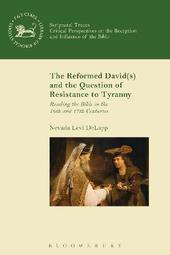
|
The Reformed David(s) and the Question of Resistance to Tyranny: Reading the Bible in the 16th and 17th Centuries
Paperback / softback
Main Details
| Title |
The Reformed David(s) and the Question of Resistance to Tyranny: Reading the Bible in the 16th and 17th Centuries
|
| Authors and Contributors |
By (author) Rev Dr Nevada Levi DeLapp
|
| Series | Scriptural Traces |
|---|
| Physical Properties |
| Format:Paperback / softback | | Pages:256 | | Dimensions(mm): Height 234,Width 156 |
|
| ISBN/Barcode |
9780567667458
|
| Classifications | Dewey:222.406 |
|---|
| Audience | | Tertiary Education (US: College) | |
|---|
|
Publishing Details |
| Publisher |
Bloomsbury Publishing PLC
|
| Imprint |
T.& T.Clark Ltd
|
| Publication Date |
25 February 2016 |
| Publication Country |
United Kingdom
|
Description
This study centers on the question: how do particular readers read a biblical passage? What factors govern each reading? DeLapp here attempts to set up a test case for observing how both socio-historical and textual factors play a part in how a person reads a biblical text. Using a reception-historical methodology, he surveys five Reformed authors and their readings of the David and Saul story (primarily 1 Sam 24 and 26). From this survey two interrelated phenomena emerge. First, all the authors find in David an ideal model for civic praxis-a "Davidic social imaginary" (Charles Taylor). Second, despite this primary agreement, the authors display two different reading trajectories when discussing David's relationship with Saul. Some read the story as showing a persecuted exile, who refuses to offer active resistance against a tyrannical monarch. Others read the story as exemplifying active defensive resistance against a tyrant. To account for this convergence and divergence in the readings, DeLapp argues for a two-fold conclusion. The authors are influenced both by their socio-historical contexts and by the shape of the biblical text itself. Given a Deuteronomic frame conducive to the social imaginary, the paradigmatic narratives of 1 Sam 24 and 26 offer a narrative gap never resolved. The story never makes explicit to the reader what David is doing in the wilderness in relation to King Saul. As a result, the authors fill in the "gap" in ways that accord with their own socio-historical experiences.
Author Biography
Nevada Levi DeLapp (Ph.D., Brite Divinity School at TCU) currently resides in Fort Worth, Texas, USA.
ReviewsA fast-paced and engaging study, in which DeLapp makes his case well. It is likely to be of particular interest to early modern historians ... However, individuals interested in the interpretation of 1 Samuel will also find plenty of food for thought. * The Expository Times * DeLapp sets out the historical and social context of his subjects of study before examining their interpretation of David's life ... there are clear advantages to this approach for the reader. * Journal of Theological Studies *
|